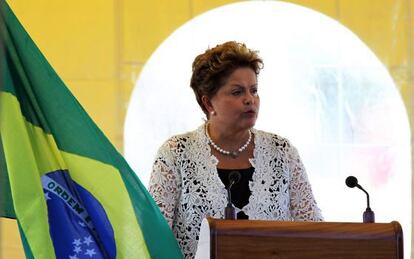Rousseff to dominate TV screens during Brazil election campaign
Alliances with nine parties will give president nearly half of airtime allotted to political ads

President Dilma Rousseff will receive more radio and TV airtime for political ad campaigns than her rivals ahead of October’s presidential run-off. The Workers Party (PT) candidate has sealed various agreements – sometimes in exchange for ministerial appointments or other positions – with Brazil’s other parties. The Brazilian political system allots a specific amount of “free airtime” to each political organization. This assigned segment may either be used or awarded to a coalition to which the party belongs. The president has the support of nine different parties – a coalition that gives her approximately 11.5 minutes of the total 25 minutes set aside for political messages.
Brazilian Social Democratic Party (PSDB) candidate Aécio Neves is Rousseff’s main rival and will only receive 4.5 minutes. Eduardo Campos, the candidate for the Brazilian Socialist Party (PSB), will have two minutes.
Brazil currently has 32 registered political parties. They are so numerous that some become bargaining chips in negotiations for public offices in exchange for airtime. Airtime is an important asset in a country where people are extremely susceptible to radio and TV ads when it comes to choosing a candidate. If the parties had to buy this time themselves, it would cost around one billion reales ($450 million). The Brazilian government pays for the ads by giving TV and radio stations, which are legally obligated to carry the messages, a tax cut worth 840 million reales ($380 million).
Airtime is a key asset in a country where people are extremely susceptible to radio and TV ads when choosing a candidate
Before the first round, campaign ads are slotted in two 25-minute blocks of airtime. Between August 19 and October 2, one block airs during lunchtime and another airs at night. The time slots also carry commercial advertisements. One-third of the time is divided up evenly among candidates. The rest of the time is allotted to political parties based on the number of representatives each has.
Rousseff has even awarded one individual a ministerial post to add another party to her coalition and thus gain more airtime. She has the official support of nine organizations and will have a substantial amount of time to push back against Brazilians’ discontent and make a case for the projects she has carried out during the last four years.
At the last minute, Senator Aécio Neves pulled in support from the Brazilian Labor Party (PTB) and thus obtained 40 seconds’ more airtime. (PTB had been a member of Rousseff’s coalition until now.) The PSDB candidate has the backing of nine political parties though five of them are small groups.
Campos has not had such luck. He was only able to attract six parties and four of them are small organizations. His around two minutes of airtime is less than one-fifth of that granted to Rousseff.
Rousseff will have a substantial amount of time to push back against Brazilians’ discontent
Party leaders had been working feverishly to cement their alliances until last Saturday when all coalitions and candidates had to fill out an official registration. This tradition of parties doing each other favors has led to agreements that have nothing to do with candidates’ actual platforms. Neves’ coalition includes the Democrats (DEM) party, an organization that defends “the limits of government business activity.” Yet, he also has the backing of the Popular Socialist Party (PPS), which declares itself to be “humanist, socialist … rescuing the best of the Marxist tradition.”
“They form alliances to get more airtime,” said Gaudêncio Torquato, a political consultant and lecturer at the University of São Paulo. “I had never seen so many strange bedfellows as I have seen in these elections [...] Election ads are the medium through which the candidates reach the people. It’s useless to create great proposals if you do not have time to talk about them.”
This political dynamic gives rise to controversial betrayals. The Progressive Party (PP), for example, surprised the country when it left the PT coalition in São Paulo and threw its support behind a rival candidate. PT members even accused the PP of accepting bribes to switch sides. PP has denied those allegations.
Political scientist Octaciano Nogueira says the problem is the number of parties and how easy it is to create them. “We need political reform. There is no reason to have 30 parties. There aren’t that many ideologies in the world.”
Translation: Dyane Jean François
Tu suscripción se está usando en otro dispositivo
¿Quieres añadir otro usuario a tu suscripción?
Si continúas leyendo en este dispositivo, no se podrá leer en el otro.
FlechaTu suscripción se está usando en otro dispositivo y solo puedes acceder a EL PAÍS desde un dispositivo a la vez.
Si quieres compartir tu cuenta, cambia tu suscripción a la modalidad Premium, así podrás añadir otro usuario. Cada uno accederá con su propia cuenta de email, lo que os permitirá personalizar vuestra experiencia en EL PAÍS.
¿Tienes una suscripción de empresa? Accede aquí para contratar más cuentas.
En el caso de no saber quién está usando tu cuenta, te recomendamos cambiar tu contraseña aquí.
Si decides continuar compartiendo tu cuenta, este mensaje se mostrará en tu dispositivo y en el de la otra persona que está usando tu cuenta de forma indefinida, afectando a tu experiencia de lectura. Puedes consultar aquí los términos y condiciones de la suscripción digital.








































